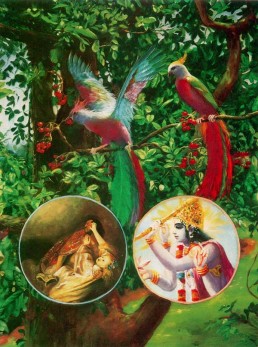Swami Chinmayananda Commentary
Arjuna confesses that he had already been taught, through the Vedic passages, that the great seers of old had indicated the INFINITE, the ETERNAL, through suggestive phraseologies, such as “THE SUPREME BRAHMAN, THE SUPREME ABODE, THE SUPREME PURIFIER, THE ETERNAL BRAHMAN, THE SELF-LUMINOUS PURUSHA, THE FIRST DEVA, THE BIRTHLESS AND THE ALL-PERVADING.” In all these cases he had heard them only as attributes of the Truth. So when he heard in his own presence, the same phrases used by Krishna, in the first person singular, he, the son of Kunti, feels lost, not knowing how to comprehend that Krishna, his charioteer, is the Source of the Whole Universe!
A practical man-of-the-world as Arjuna was, he needed more data, and we shall discover that in order to satisfy this demand, Krishna supplies enough information in this very same chapter. But, instead of satisfying Arjuna, it only sharpens his curiosity and compels him to demand from Krishna an experimental demonstration, which also is provided by Krishna in the following chapter (Chapter XI).
The ancient seers mentioned here, “Narada, Asita, Devala, and Vyasa,” cannot be very familiar to the students of the Upanishads. Vyasa, perhaps, deliberately quotes these Rishis mentioned in his Puranas.
Arjuna acknowledged and recognised these phrases, indicating the attributes of the Lord, only as empty and purposeless words, though they had come from accepted great teachers. His actual surprise was clearly expressed in his words “SO ALSO YOU YOURSELF REPEAT TO ME.” Here the occasion for Arjuna’s staggering confusion was, how his own contemporary, Lord Krishna — a living creature standing right in front of him, whom he knew all these years, and was even related to — could Himself be the Infinite, the Supreme, the Birthless, and the All-pervading.
Arjuna looks at Krishna with his physical eyes and he sees only Krishna’s physical structure. Krishna has been declaring Himself as the pure Self throughout the Geeta and not as a living member of the society. “Sri Krishna Paramatman” is the teacher in the Geeta and not the son of Vasudeva, or the lover of the gopis. Arjuna could not comprehend ‘Krishna-the-Spirit,’ in his pre-occupation with ‘Krishna-the-friend,’ ‘Krishna-the-lover,’ ‘Krishna-the-dependable man of intellect and diplomacy.’ Hence the Pandava prince’s wonderment and confusion.
THE FOLLOWING IS GIVEN TO BRING OUT CLEARLY THE ATTITUDE OF THE SEEKER IN ARJUNA WHEN HE ASKS THIS QUESTION:
Adi Sankara Commentary
Bhavan, You; are the param brahma, supreme Brahman, the supreme Self; the param dhama, supreme Light; the paramam pavitram, supreme Sanctifier. Sarve, all; rsayah, the sages-Vasistha and others; tatha, as also; the devarisih, divine sage; naradah, Narada; Asita and Devala ahuh, call; tvam, You; thus: Sasvatam, the eternal; divyam, divine; purusam, Person; adi-devam, the Primal God, the God who preceded all the gods; ajam, the birthless; vibhum, the Omnipresent-capable of assuming diverse forms. And even Vyasa also speaks in this very way. Ca, and; svayam, You Yourself; eva, verily; bravisi, tell; me, me (so).
The Bhagavad Gita with the commentary of Sri Sankaracharya – Translated by Alladi Mahadeva Sastry
Holy Geeta – Commentary by Swami Chinmayananda
The Bhagavad Gita by Eknath Easwaran – Best selling translation of the Bhagavad Gita
The Bhagavad Gita – Translation and Commentary by Swami Sivananda
Bhagavad Gita – Translation and Commentary by Bhaktivedanta Swami Prabupadha
Srimad Bhagavad Gita Chapter 10 – Verse 13 – 10.13 ahustvamrsayah sarve – All Bhagavad Gita (Geeta) Verses in Sanskrit, English, Transliteration, Word Meaning, Translation, Audio, Shankara Bhashya, Adi Sankaracharya Commentary and Links to Videos by Swami Chinmayananda and others – 10-13

